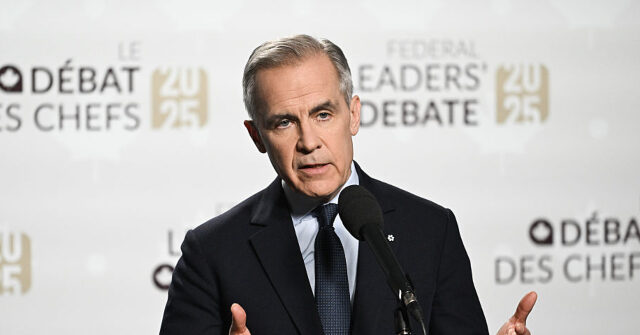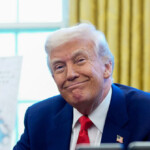Canadian Prime Minister Mark Carney distanced himself from predecessor Justin Trudeau repeatedly during the first debate of the current election cycle, insisting he had only “just got here” to the top government position.
Carney assumed the prime ministership in March following Trudeau’s announcement in January that he would resign after a decade in power. While winning the internal Liberal Party race for leadership by a landslide, Carney has not yet been elected prime minister and had never held a political position or ran for office prior to becoming head of government.
Canadians will go to the polls on April 28 to choose whether to keep Carney on as their prime minister or empower one of the nation’s other top political parties. Carney’s top rival is the leader of the Conservatives, Pierre Poilievre, who enjoyed a two-digit lead against the Liberals in January but is now trailing the Liberals decisively in multiple polls. The debate, moderated by Radio-Canada journalist Patrice Roy, was the first time the two met face-to-face for a policy discussion.
In addition to Poilievre, Carney squared off against the leaders of two other major parties, Jagmeet Singh of the far-left New Democratic Party (NDP) and Yves-François Blanchet of the Bloc Québécois.
The first debate of the election cycle was held in French and broadcast with English-language subtitles in some avenues; the leaders are scheduled to debate again on Thursday night in English.
Singh, Blanchet, and Poilievre spent much of the debate targeting Carney rather than each other, repeatedly condemning Liberal Party policies for their disastrous impact on the nation’s immigration system, health care, and economy. Carney used the opportunities to distance himself from his ruling party. In one instance, Blanchet condemned Carney for failing to reach out to opposition leaders for ideas on how to handle the ongoing tariff dispute with the United States.
“You have never spoken to me before this evening,” Blanchet revealed, “you’re not trying to figure out how to collaborate between equals… you’re trying to score divisive points that only serve the United States of America.”
“I’ve just started,” Carney replied. “I’ve been prime minister for a month.”
Later in the debate, Poilievre again asked Carney about the woeful decade-long record in leadership that his party left for him.
“Aren’t you embarrassed to ask Canadians for a fourth mandate after having the worst record?” Mr. Poilievre asked.
“I just got here,” Carney replied.
Poilievre dismissed Carney’s claims to novelty, recalling that Carney served as an adviser on economics and the disastrous Canadian response to the Wuhan coronavirus pandemic during Trudeau’s tenure.
“When you were Justin Trudeau’s economic adviser, you weakened our economy,” Poilievre accused on one occasion.
During a separate part of the debate, Poilievre told Carney, “your party has been in power for ten years and in that time… your policies that have blocked resources… liberal legislation has prevented development and you continue to support those laws.”
The Conservative Party followed up on that line of attack following the debate, linking Carney to the unpopular Trudeau.
Carney’s relationship with Trudeau is of particularly importance in part due to the fact that Trudeau stepped down after a meeting with then-President-elect Donald Trump intended to avoid the imposition of onerous tariffs on the American economy. Trudeau’s visit to Mar-a-Lago was met with disgust among many Canadians and prompted one of his closest confidantes, Chrystia Freeland, to resign as deputy prime minister and run for the leadership of the Liberal Party herself. Carney soundly defeated her in the Liberal Party leadership election after her betrayal.
The topic of how to properly develop a relationship with Trump was prominent at the debate. Carney insisted that Trump respected “strength.”
“We are in a crisis, the most serious crisis of our lives,” Carney told viewers. “We need to react with resounding, overwhelming strength — yes we need to cut taxes… [but] we need to have a government ready to act.”
“We have to react with strength and those are the elements that will allow us to succeed with Mr. Trump. He respects strength, he respects people who understand how the world works and who understand how the private sector works,” Carney added — a barb at Poilievre, who became a member of Parliament at age 25 and has remained there since.
Poilievre, in turn, offered plans to expand the domestic Canadian economy.
“No one can control the decisions of Donald Trump. But we can control our domestic economy by reversing the economic policies that the Liberals brought in that weakened our economy,” Poilievre said.
Blanchet claimed that “Trump will hang on his own noose because their economy is dependent on ours,” bizarrely claiming that Canada’s GDP and population are larger than America’s.
Elsewhere in the debate, the other candidates mocked Carney for admitting in a recent interview that he does not shop for his own groceries and so does not know the typical price of strawberries. Asked about the price of strawberries, Carney said that while it may sound “bizarre,” “someone” does the shopping for him.
Roy asked the candidates what American products they were personally boycotting to the protest the tariffs, to which three of the four candidates emphasized that they did their own shopping. Blanchet and Singh said they had ceased buying American fruit — Singh noting that he does his own shopping and cooking — while Poilievre said he bought only Canadian beef. Carney answered rapidly that he was boycotting American wine and alcohol.
The economic situation with the United States dominated the debate, which did not feature any major discussion on China. The Canadian government revealed in early April that it had discovered a Chinese propaganda operation promoting Carney amid growing speculation that his relationship in the private sector with Beijing could compromise him. Carney reportedly visited Beijing in October as part of his job with Brookfield Asset Management, his previous employer, and recently met with members of a Chinese influence operation, the Jiangsu Commerce Council of Canada (JCCC). Carney denied any such meeting with the JCCC despite the group publishing photos of him shaking hands with its members.
The CBC News average of polls showed Carney with a five-point lead over Poilievre as of Thursday, at 43 percent compared to the Conservatives’ 38 percent. Polls included in the Thursday morning average were taken before the debate.



